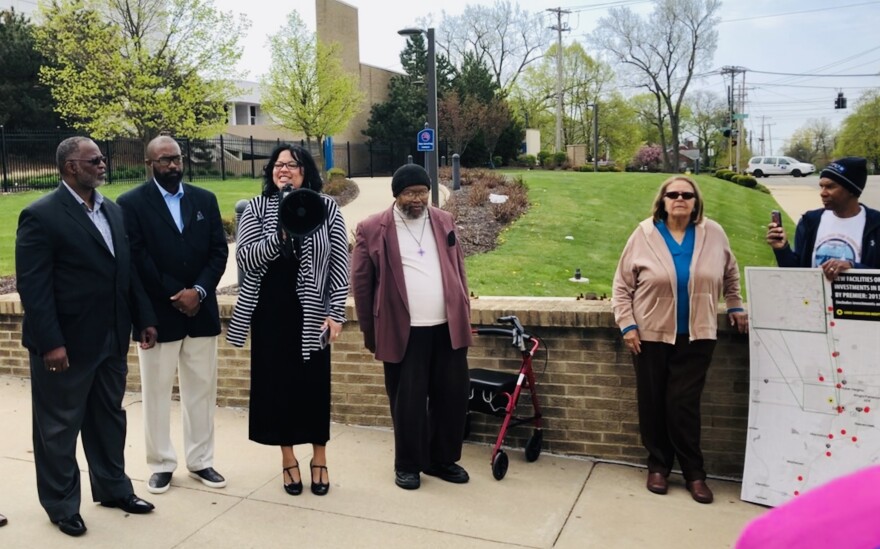Members of the West Dayton Clergy Community Coalition gathered with a handful of neighborhood residents outside the former Good Samaritan Hospital complex on Salem Avenue Tuesday morning.
The assembly was a rallying cry, meant to urge former Good Sam patients to come forth with testimony that might be given to investigators from the United States Department of Health and Human Services civil rights division when they arrive in Dayton the week of May 6.
After confirming the investigators' arrival, Rev. Rockney Carter put out a call to Dayton residents who may have been impacted by Premier Health's closure of the Salem Avenue Good Sam facility in 2018.

"We want you to have hope. We want you to have encouragement. We want you to have the peace that comes from knowing that your cries have been heard," Rockney told the crowd. "We have the investigators who are coming to town to hear from our people [...] we want people who have been impacted. That means that if you can't get your prescriptions, if you can't see your doctor, if your doctor has moved, please see some of our staff so that we can get your story because we've got to put the people in front of the investigators."
Even with demolition of Good Samaritan underway, Rockney implored people to come forward with their stories. "This is our time," he said in an appeal to the broader Dayton community.
If the frequent honking from passing cars during the rally was any indication, there is likely broad support for the coalition's efforts to save Good Samaritan, or at least preserve it as a potential health-care facility in the future.
Premier Health has taken steps to ensure that future use of the site for health care is limited.

Last May, the clergy group argued Premier’s decision to close Good Sam, and limit its future health-care use, would have a disproportionate impact on African Americans on the city's west side.
In addition to the federal complaint, several state representatives have called for revoking Premier Health's non-profit status.
In February of 2018 both Five Rivers Health Centers and Grandview Hospital separately announced plans to expand and mitigate, to some degree, the loss of Good Samaritan's westside health-care services.
But Rev. Merritt Worthen, coalition vice president, says progress on those two fronts has been slow.
“When you consider the fact that we already had long waiting hours at Grandview to start with, and at Good Sam at peak times, Five Rivers, when a lot of trauma happens, they will be closed. I haven't heard them being open 24 hours, so when something happens at midnight -- 12 or one o’clock in the morning -- when you're a trauma patient, or giving birth and you got to go 20, 30 minutes? God forbid that you don't have your own transportation, you have to wait for somebody. It's not enough,” she says.

Premier is standing by its assertion that Good Samaritan was operating at nearly half-capacity before its closure and that Miami Valley Hospital would be able to serve many westside residents as well.
Worthen disputes the assertion, pointing to the apparent disparity in Premier Health’s recent expansion to some more affluent, mostly white Dayton communities to support the argument behind the clergy coalition’s civil rights suit.
“You can go south, and I'm telling you, I can walk a few blocks and I'm at Kettering or Primed facility in a matter of five to seven minutes. And here, now that Good Sam is gone, you're talking 15 to 20 minutes. And when they say things like strokes, heart attacks, giving birth, any sort of violent crime where somebody's been stabbed or shot, minutes count, seconds count, and we can't afford to have hospitals and health care this far apart. So no, it’s not going to be enough. It’s not even close to enough,” Worthen says.
The Clergy Community Coalition is gathering community testimony in advance of the federal investigators' arrival May 6. Anyone interested in sharing their experiences is asked to call (937) 422-4391, or email cccforgoodsam@gmail.com.





